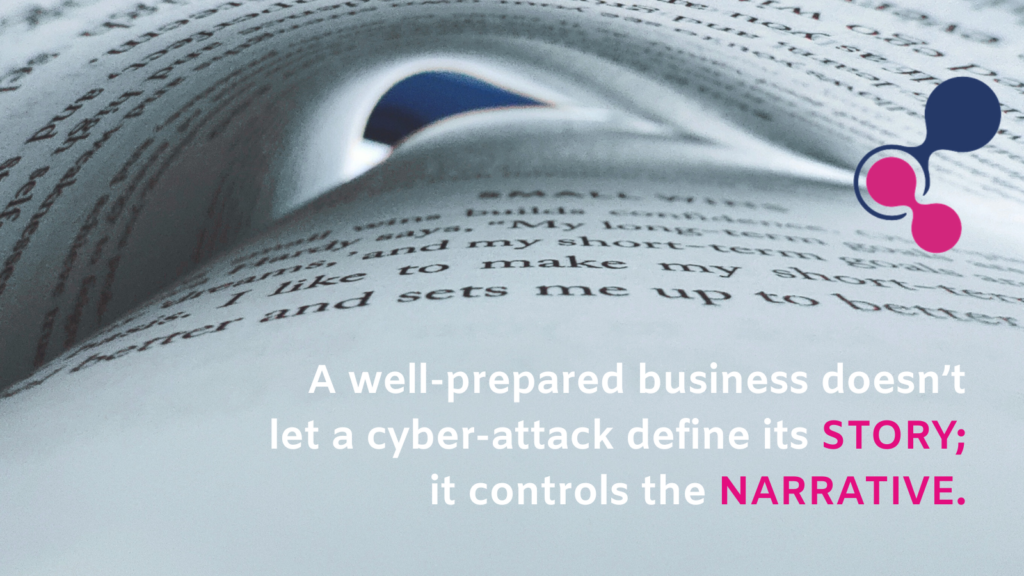By Robbie Ross, CSO, Converged Communication Solutions
Listen to this article
When cyber-attacks hit, it’s not just systems under scrutiny — it’s how a business communicates that defines whether it’s seen as a victim or negligent.
Just ask Marks & Spencer and the Co-op, two major UK retailers that recently found themselves in the crosshairs of cyber-attacks.
For Marks & Spencer, a ransomware attack brought key systems to a standstill, disrupting online orders and store operations. Meanwhile, the Co-op faced a data breach that reportedly exposed personal details from 20 million customers, leading to empty shelves and operational chaos.
But when a cyber-attack happens, is it fair to blame the victim, believing they were unprepared? When another high-profile hack hits the headlines, is your first thought “that’s such a shame for the victim” or do you think “they should have been able to prevent that from happening”?
The thing is cyber security isn’t just about prevention. It’s about preparation and response.
Don’t Just Survive the Breach. Survive the Backlash.
Businesses can invest heavily in cyber security, yet cyber criminals keep evolving, finding new ways to infiltrate systems. No security framework is bulletproof, and when breaches occur, the fallout extends beyond operational setbacks, it hits reputation.
A cyber-attack invites scrutiny. Customers, partners, and stakeholders start asking: Was the company truly prepared?
Cyber Essentials: A Shield Against Reputational Damage
One way businesses can counter reputational risk is by demonstrating compliance with established security standards. Holding Cyber Essentials certification proves due diligence and reassures stakeholders that the business met government-approved security benchmarks.
Cyber Essentials helps a business implement key security measures, including:
- Securing internet connections
- Protecting your devices and software
- Controlling access to your data
- Defending against malware
- Keeping your systems updated
Beyond strengthening your defences, having Cyber Essentials demonstrates that security wasn’t ignored, in fact it was prioritised.

Own the Narrative with Incident Response Planning
A well-prepared business doesn’t let a cyber-attack define its story; it controls the narrative.
Robust incident response planning ensures swift action when disaster strikes. It reassures customers, partners, and staff that cyber security wasn’t an afterthought.
A Cyber Security Incident Response Plan guarantees that when an attack occurs you can follow a clear, structured process. With the right plan in place, everyone knows their role, responds effectively, and works to minimise damage, keeping your business secure.
A strong response plan will:
- Keep the damage in check – Whether it’s a data breach or ransomware attack, a comprehensive plan helps minimise the financial, operational, and reputational fallout.
- Keep you running – Business continuity is key. A response plan ensures that critical operations don’t come to a standstill, even during a cyber crisis.
- Let you act fast – The quicker you can respond, the better. A clear plan means your team knows exactly what to do to contain and manage the threat.
- Build resilience – Regularly testing and updating your plan not only improves your response, but it also strengthens your overall security posture.
- Reassure your stakeholders – Customers, partners, and investors want to know you’re prepared. A solid plan shows you take cyber security seriously.
Without a plan, businesses scramble in panic, and that leads to longer downtime, bigger losses, and greater reputational damage.
Final Thoughts: Have you earned the right to defend your business in the event of a breach?
The truth is, when a cyber-attack strikes, the breach itself is only half the story — the other half is how your business responds in the spotlight. Owning the narrative can protect your reputation, but only if you’ve genuinely earned the right to defend it. Silence, vague statements, or visible chaos create doubt. Preparedness, proven through action, certification, and clear communication is what earns trust when it matters most. Because in a crisis, you’re not just managing systems. You’re managing perception.

